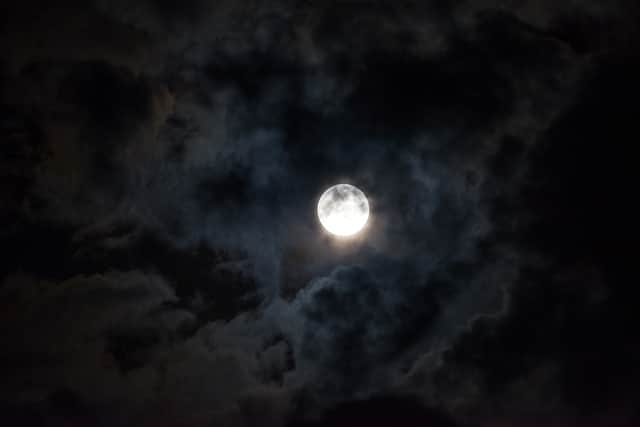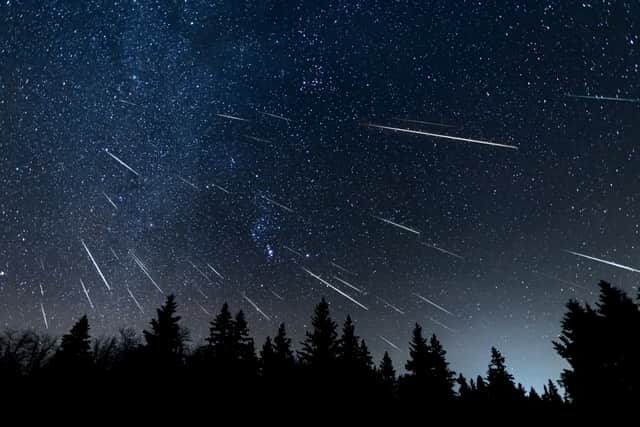When is the next full moon? Full night sky calendar for January 2023 and stargazing tips
and live on Freeview channel 276
With the new year comes a brand new calendar filled with spectacular night sky events and stargazing opportunities across the UK. 2023 got off to an exciting start for stargazers with the first full moon taking place on January 6, and some areas getting clear enough conditions for a good view of the Wolf Moon.
As we make our way through the year astronomers won’t be stuck waiting for things to look forward to with an array of events on the way. Highlights of the year ahead will include full moons, meteor showers and both lunar and solar eclipses. Other stand out points will be in December when debris from Biela’s Comet will strike earth.
Advertisement
Hide AdAdvertisement
Hide AdGazing up at the sky for a little bit of solace or escapism from our busy lives has continued to rise in popularity as Astro tourism sees travellers venturing to breath-taking off-the-grid destinations to experience the unparalleled beauty of our galaxy. Whether you’re an amateur astronomer or a cosmic expert, stargazing has been a popular hobby for millions since ancient times.
So, what are the biggest events coming to the night sky this January? Here’s a breakdown of what to expect as we kick off 2023.
When is the next full moon?
The next full moon is on February 5, at 6.28pm in the UK, and is sometimes known as a ‘Snow Moon’.
The Old Farmer’s Almanac said there will be 13 full moons throughout the year. These are listed below.
Advertisement
Hide AdAdvertisement
Hide Ad- January 6: Wolf moon
- February 5: Snow moon
- March 7: Worm moon
- April 6: Pink moon
- May 5: Flower moon
- June 3: Strawberry moon
- July 3: Buck moon
- August 1: Sturgeon moon
- August 30: Blue moon
- September 29: Harvest moon
- October 28: Hunter’s moon
- November 27: Beaver moon
- December 26: Cold moon
How often does a full Moon occur?
The Royal Museums Greenwich confirms that a full Moon happens roughly every 29.5 days. This is the length of time it takes for the Moon to go through one whole lunar phase cycle.


Full night sky calendar for January 2023
Venus and golden Saturn pair up in the January 2023 evening sky. You’ll find Venus higher in the west after sunset at the close of each new day, as dimmer Saturn sinks lower. Here is the full list of night sky events across January:
- Saturn’s rings visible for the first time in five years, January 1-6
- Wolf moon on January, 6
- The Quadrantid meteor peaked on January, 3-4
- Mercury passes between the Earth and the Sun - January, 7
- Throughout the whole month you can admire Sirius, the brightest star in the night sky.
- Throughout the month you can find the winter triangle or winter hexagon.
- Wolf Moon - Last Quarter – January, 15 (02:10am)
- New Moon – January, 21 (20:53pm)
- First Quarter – January, 28 (15:19pm)
Top Stargazing Tips
Stargazing is easy, you just go outside and look up at the night sky, however, there is much more to it than seeing the moon shine and stars sparkle above us.


The best tip is finding a dark-sky site, and making sure to check the weather forecast before going. Light pollution can often affect how much of the night sky occurrences we see, even more so the weather conditions can be cloudy which again would make it hard to see the stars.
Advertisement
Hide AdAdvertisement
Hide AdFind a clear spot where you can see as close to the horizon as possible is a good starting point for finding a spot that will give you the best opportunity to see the sky if you are unable to get to a dark-sky site.
Stargazing is a really popular hobby for amateurs and professionals so it’s likely that there is a club near you, or that your friends have a similar interest. Finding a buddy or club to join on the cold dark nights is always helpful, and one of the best ways to stay safe when stargazing.
EarthSky advises beginners not to invest in a telescope straight away, they are a big investment so start with binoculars if you are wanting to get a closer look. It’s worth noting that it’s possible to see many of the night sky events with just your eyes in the right conditions.
